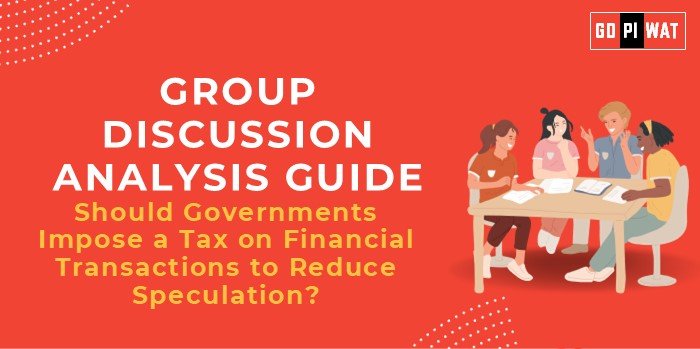📋 Group Discussion Analysis Guide: Should Governments Impose a Tax on Financial Transactions to Reduce Speculation?
🌍 Introduction to Financial Transaction Taxes (FTT)
- 💡 Opening Context: Financial Transaction Taxes (FTT) have emerged as a debated policy tool to curb excessive speculation, enhance market stability, and generate public revenue, often referred to as a “Tobin Tax.”
- 📜 Topic Background: Proposed by economist James Tobin in 1972, the FTT concept gained traction during the 2008 financial crisis as governments sought mechanisms to regulate volatile financial markets. The European Union has considered implementing an FTT across member states, while countries like France and Italy have partial FTT regimes.
📊 Quick Facts and Key Statistics
- 🌍 Global Prevalence: 40+ countries, including the UK (stamp duty), apply some form of FTT.
- 💰 EU Proposal: A 0.1% FTT could raise €57 billion annually.
- 📈 US Market Stats: Over $1 trillion in daily trading volumes, highlighting speculative activity.
- 🇮🇳 India’s STT: Securities Transaction Tax contributes ₹10,000+ crore annually to government revenue.
👥 Stakeholders and Their Roles
- 🏛️ Government: Enforces taxation to regulate markets and fund public expenditure.
- 📊 Investors: Faces potential impact on trading behavior, especially high-frequency traders.
- 🏦 Financial Institutions: Opposes FTT due to reduced liquidity and increased costs.
- 📋 Regulators: Monitors market stability and ensures compliance.
🏆 Achievements and ⚠️ Challenges
Achievements:
- ✅ Revenue Generation: France’s FTT generates €1.5 billion annually, funding social programs.
- 📉 Market Stability: Evidence suggests reduced frequency of high-frequency trades.
- 🌍 Redistributive Effect: Taxes on speculative profits can fund welfare initiatives.
Challenges:
- ⚠️ Liquidity Concerns: Reduced trading volumes may limit market efficiency.
- 📤 Evasion Risks: Investors might migrate to untaxed jurisdictions.
- 💸 Adverse Impact on Retail Investors: Even small-scale investors may face higher transaction costs.
Global Comparisons:
- 🇬🇧 Success: UK’s stamp duty successfully generates £3.8 billion annually without significant liquidity loss.
- 🇸🇪 Struggles: Sweden’s 1984 FTT led to capital flight, forcing a repeal in 1991.
Case Study:
- 🇮🇳 India’s STT: Balances revenue generation with market stability, though some argue it deters retail participation.
📋 Structured Arguments for Discussion
- 📈 Supporting Stance: “FTT discourages harmful speculation and funds essential public services, contributing to economic stability.”
- 📉 Opposing Stance: “FTT may harm market liquidity, hinder economic efficiency, and drive capital flight.”
- ⚖️ Balanced Perspective: “FTT’s success depends on careful design, exemptions for retail investors, and global cooperation.”
💡 Effective Discussion Approaches
- 📊 Opening Approaches:
- 📈 “With over 40 nations implementing FTT, it raises €60 billion globally, showcasing its potential impact.”
- 📖 “The Tobin Tax, proposed to curb currency speculation, remains relevant in today’s volatile markets.”
- 🔍 Counter-Argument Handling:
- 💬 Emphasize regulation over revenue in addressing market volatility.
- 📉 Propose phased implementation to mitigate liquidity shocks.
🔍 Strategic Analysis of Strengths and Weaknesses
- ✨ Strengths: Revenue for social programs, discouragement of speculative trading, potential to stabilize financial markets.
- ⚠️ Weaknesses: Capital flight risks, impact on liquidity, administrative challenges.
- 🚀 Opportunities: Global coordination, fintech-enabled transparency, progressive taxation design.
- ⛔ Threats: Resistance from financial lobbies, competitive disadvantage in global markets.
📘 Connecting with B-School Applications
- 📚 Real-World Applications:
- 📊 Finance: Studying the impact of FTT on market liquidity and investor behavior.
- 🏛️ Public Policy: Designing tax frameworks for sustainable revenue generation.
- 💬 Sample Interview Questions:
- 🔎 “What are the potential trade-offs of implementing an FTT?”
- 🔎 “How can governments ensure FTT effectiveness without driving capital flight?”
- ✨ Insights for Students:
- 📜 Explore FTT as a case study in market regulation and public finance.
- 🌐 Analyze global policy alignment and its impact on financial markets.


